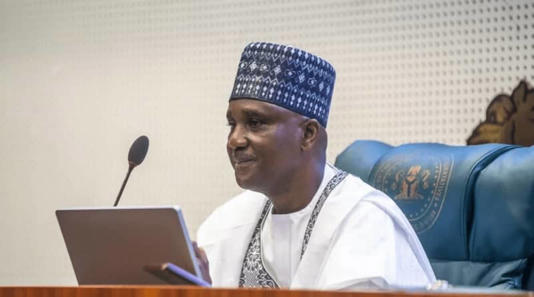The House of Representatives has passed through second reading, a Bill for an Act to provide for the rights of Nigerian citizens living outside the country to vote in certain elections conducted at home.
The proposed legislation is being sponsored by Speaker Abbas Tajudeen and Hon. Sadiq Ango Abdullahi, both from Kaduna State.
Leading the debate on the general principles of the Bill on Diaspora Voting on behalf of the Speaker on Tuesday, Hon. Abdullahi argued that Section 39 of the 1999 Constitution (as amended) grants citizens the fundamental right of freedom of expression and opinion.
“All citizens therefore irrespective of their location anywhere in the globe should be given that right and freedom to express themselves in our country’s general election,” he said.
The Speaker argued that since Nigerians abroad meet their financial obligations to the country through remittances, it was fair and proper that they are given the right to carry out their civic responsibility of expressing their leadership preferences during elections.
“It is widely believed that diaspora remittances have contributed remarkably to the development of Nigeria. Nigerians in diaspora make considerable contribution to the Nigerian economy through huge financial inflow to the country. Sadly, existing laws in Nigeria have not made any provision granting voting rights to Nigerians in diaspora.
“Consequently, the agitation for voting rights for Nigerian in diaspora has continued to gain momentum. It is a practice that allows for holistic inclusiveness in a democratic society,” he said.
Explaining further, the Speaker said: “Section 1 of the bill guarantees the voting rights of Nigerian citizens living outside Nigeria. The section provides that elections to be conducted under this Act if passed shall include elections which the Commission is empowered by law.
“Section 4 provides that this Act if passed shall not invalidate existing laws in Nigeria. It only provides a platform for Nigerians in diaspora to participate in elections conducted in Nigeria.”
He added that the benefit of such a Bill, if passed into law, will be that it allows Nigerians in their respective countries of residence to vote in Nigeria’s general election without the rigours and logistic challenges of travelling to Nigeria to exercise their voting rights, among others.
Also, the House passed through second reading, a Bill seeking protection for government entities from failure by contractors to deliver a contract within a targeted period, equally sponsored by Speaker Abbas and Hon. Marcus Onobun.
Leading the debate on the general principles of the Bill, Hon. Onobun, who spoke on behalf of the Speaker, said the draft legislation would provide better protection for procuring government entities, who often find themselves at the receiving end whenever contractors fail to deliver on their contractual agreements.
He noted that: “A community reading of the objectives, powers, and functions of the Bureau of Public Procurement under the Act establishes the fact that the intendment of the Act is to protect the interest of stakeholders, particularly the procuring entity, and the contractors in the procurement process to ensure transparency, timeous and quality delivery of goods and services among others.”
Onobun, however, observed that; “the gap in the Act, which the Bill, if passed, seeks to remedy is contained in Section 37 of the Act as the section seems to make provisions for the protection of contractors in the event of delay of payment to the contractors without any requisite provisions for the protection of the procuring entity in the event that a contractor fails to deliver a contract within the targeted period.
“For ease of reference, the existing section 37 provides as follows: “S.37 (1) Payment for the procurement of goods, works, and services shall be settled promptly and diligently.
“(2)Any payment due to more than sixty days from the date Of the submission of the invoice, valuation certificate or confirmation or authentication by the Ministry, Extra-Ministerial Office, government agency, parastatal or corporation shall be deemed a delayed payment.
“(3) All delayed payments shall attract interest at the rate specified in the contract document. (4)All contracts shall include terms, specifying the interest for late payment of more than sixty days.
“It is clear from the above that there has to be a contract document that must make provisions for payment of specified interest to contractors in the event their payment is delayed.”

